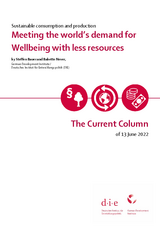The Current Column
Sustainable consumption and production
Meeting the world’s demand for Wellbeing with less resources
Bauer, Steffen / Babette NeverThe Current Column (2022)
Bonn: German Development Institute / Deutsches Institut für Entwicklungspolitik (DIE), The Current Column of 13 June 2022
Bonn, 13 June 2022. Earlier this month, global leaders met in Stockholm to commemorate the 50th anniversary of the first world conference dedicated to the environment, the United Nations Conference on the Human Environment. The conference emphasised the environmental dimension of sustainable development and resolved to set the world on a pathway to achieve a healthy planet and prosperity for all – in spite of multiple global crises and unprecedented ecological deterioration. Inger Andersen, Secretary-General of the Stockholm+50 conference and Executive Director of the UN Environment Programme called for “a new compass for welfare” to reconsider humankind’s understanding of progress and wellbeing.
This postulate is less utopian than it looks at first sight. The most recent report of the Intergovernmental Panel on Climate Change (IPCC) has provided compelling evidence that welfare and wellbeing are feasible even with substantially reduced resource consumption. Demand-side measures merit particular attention to that end - also in low and middle income countries. The IPCC identifies a 40-70% greenhouse gas mitigation potential for end-use interventions (e.g. energy efficient appliances, buildings) as well as numerous benefits for various sustainable development goals (SDGs). Examples include prolonged life expectancy and improved health due to reduced air pollution, more active mobility choices, and access to clean energy. Reaping such benefits and aligning them with wellbeing requires the more systematic linking of policies and programmes on sustainable consumption and production (SCP).
Arriving at a commensurate understanding of wellbeing is a political challenge, especially in low and middle income countries. So far, the measurement of multi-dimensional poverty provides the most advanced orientation. Applying it to SCP means determining which products and services we really need to live healthy, decent lives without worrying about basic needs. Countries at all development levels need to figure this out with an eye to equity both within societies and across countries.
Sustainable consumption is already practiced in low and middle income countries, for instance when it comes to energy saving, shared mobility, decentral digital markets, repair and recycling services or innovative plastic re-use start-ups. Yet, such practices are often realised in informal and marginalised settings of poverty, precarious working conditions and environmental hazards. The challenge is to scale up and to align such practices with the economic aspirations and consumer preferences of growing, urbanizing middle classes. Then, it can unleash a virtuous cycle in which SCP and development could reinforce each other by creating economic benefits through viable business innovations, decent work and improved health.
Conducive factors are well known!
Four conducive factors for such a virtuous cycle are well known already:
First, the strategic set-up of infrastructures and lifecycle-oriented product designs that enable sustainable choices, for instance in transport systems, buildings and utiliies. Second, integrated approaches that zoom in on local and regional markets with the objective to link local consumption patterns (e.g. of fashion labels and food programmes) with production processes and value chains. Third, upgrading of existing sustainable practices and respective innovations in informal economies, for instance repair and reuse initiatives. Fourth, advancing wellbeing norms over norms of consumerism and convenience. Indeed, in many low and middle incoume countries such norms are still evolving and the co-benefits of sustainable choices can be easily demonstrated in light of conspicuous environmental externalities.
Policy frameworks need to align norms of wellbeing with consumption and production
Individual consumers or businesses will not be able to systematically achieve these changes alone. Commensurate policies are required to alter the frameworks of consumption and production and to thereby adjust the structures beyond individual responsibilities for the consumption of goods and services.
The outcome of the Stockholm+50 summit now provides a universal reference point. Just as its historic predecessor in 1972 provided the basis for international environmental law, the summit may set the tone for a normative reframing towards human wellbeing and planetary health. This frame needs to be filled with life at all levels across societies. Differentiated policy approaches to support the wellbeing of different stratas of society are required. Whereas poor rural households may still need to increase consumption, for instance to overcome malnutrition, the growing urban middle classes need guidance and incentives to shift towards sustainable consumption and low-carbon alternatives. Context-specific research on the enabling conditions for SCP and practical international cooperation can jointly support both the calibration and application of a global compass for wellbeing. This will tap into the power and potential of demand-driven solutions.



